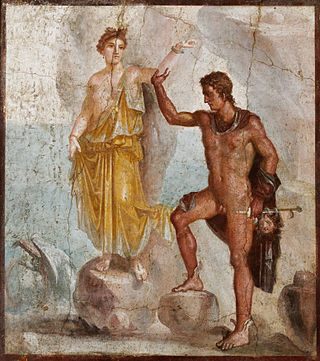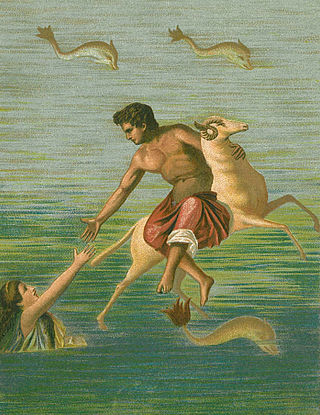
In Greek mythology, Alcmene or Alcmena was the wife of Amphitryon, by whom she bore two children, Iphicles and Laonome. She is best known as the mother of Heracles, whose father was the god Zeus. Alcmene was also referred to as Electryone, a patronymic name as a daughter of Electryon.

In Greek mythology, Andromeda is the daughter of Cepheus, the king of Aethiopia, and his wife, Cassiopeia. When Cassiopeia boasts that she is more beautiful than the Nereids, Poseidon sends the sea monster Cetus to ravage the coast of Aethiopia as divine punishment. Queen Cassiopeia understands that chaining Andromeda to a rock as a human sacrifice is what will appease Poseidon. Perseus finds her as he is coming back from his quest to decapitate Medusa, and brings her back to Greece to marry her and let her reign as his queen. With the head of Medusa, Perseus petrifies Cetus to stop it from terrorizing the coast any longer.

In Greek mythology Phrixus was the son of Athamas, king of Boeotia, and Nephele. He was the older brother of Helle and the father of Argus, Phrontis, Melas and Cytisorus by Chalciope (Iophassa), daughter of Aeetes, king of Colchis.
In Greek mythology, Euphemus was counted among the Calydonian hunters and the Argonauts, and was connected with the legend of the foundation of Cyrene.
In Greek mythology, Electryon was a king of Tiryns and Mycenae or Medea in Argolis.
In Greek mythology, Coeus, also called Polus, was one of the Titans, one of the three groups of children born to Uranus (Sky) and Gaia (Earth).
Corythus is the name of six mortal men in Greek mythology.
In Greek mythology, Oebalus, also spelled Oibalus or Oibalius, was a king of Sparta.
In Roman mythology, the Aeneads were the friends, family and companions of Aeneas, with whom they fled from Troy after the Trojan War. Aenides was another patronymic from Aeneas, which is applied by Gaius Valerius Flaccus to the inhabitants of Cyzicus, whose town was believed to have been founded by Cyzicus, the son of Aeneas and Aenete. Similarly, Aeneades was a patronymic from Aeneas, and applied as a surname to those who were believed to have been descended from him, such as Ascanius, Augustus, and the Romans in general.

In Greek mythology, Perseus is the legendary founder of the Perseid dynasty. He was, alongside Cadmus and Bellerophon, the greatest Greek hero and slayer of monsters before the days of Heracles. He beheaded the Gorgon Medusa for Polydectes and saved Andromeda from the sea monster Cetus. He was the son of Zeus and the mortal Danaë, as well as the half-brother and great-grandfather of Heracles.
In Greek mythology, Alcaeus or Alkaios was the name of a number of different people:

In Greek mythology, Absyrtus or Apsyrtus was a Colchian prince and the younger brother of Medea. He was involved in Jason's escape with the golden fleece from Colchis
In Greek mythology, Sthenelus was a king of Tiryns and Mycenae, and the son of Perseus who founded the latter city.
In Greek mythology, Mestor was the name of four men.
In Greek mythology, Heleus or Heleius, also Helius (Ἕλιος), was a Mycenaean prince.
In Greek mythology, Autochthe was a Mycenaean princess and a member of the Perseid dynasty.
In Greek mythology, the name Henioche may refer to:
In Greek mythology, the Doliones or Dolionians were the people living on the coast of the Propontis, visited by the Argonauts. They were ruled by Cyzicus, son of Aeneus and Aenete.
Menippe in Greek mythology may refer to the following women:
In Greek mythology, Gorgophone was queen of both Messenia and Sparta and a member of the Perseid dynasty. Her name means "Gorgon Slayer", a tribute to her father Perseus who killed Medusa, the mortal Gorgon.